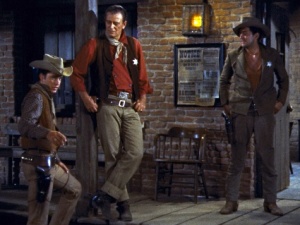[10]
An unshakable sheriff and his riff-raff crew brace for a days-long siege when a swarm of bad guys descend on their town, threatening to free one of their own from jail. Rio Bravo is the last great film from legendary director Howard Hawks (Scarface, Bringing Up Baby, The Big Sleep). It’s not the epic western you might imagine from Hollywood in the ’50s. Nor is it the transgressive type of western that the ’60s would soon usher into vogue. There’s nothing landmark about Rio Bravo — it’s just good old-fashioned storytelling with characters you’ll always remember.
As scripted by Jules Furthman and Leigh Brackett, Rio Bravo is a long, slow build — but there’s a feeling of impending doom that drives the narrative in the absence of elaborate shoot-outs or action sequences (not that there aren’t a few thrills along the way). Hawks is much more interested in building character relationships. He puts the script and the performances front and center, keeping his own style (as always) classically invisible. As a result, we get a film that basks in good humor, masculine camaraderie, and more than its fair share of grace notes. I felt incredibly ‘at home’ with the characters of Rio Bravo.
John Wayne stars as the sheriff, Chance. Wayne may be one of the most caricatured performers of the century, but don’t let that blind you to his natural ease and commanding presence. He’s wonderful as Chance, the patriarch of the film’s motley ensemble. Dean Martin puts in a surprisingly good performance as Dude, a broken man recovering from alcoholism and ‘the girl who got away’. His efforts to reclaim his dignity give the film some of its most poignant moments, and his relationship with Chance is the backbone of the story. We root for Dude because Chance still has faith in him — it’s camaraderie among men at its finest, a staple of all Hawks’ work.

But as far as male bonding goes, Rio Bravo goes a step further than other Hawks films. With Walter Brennan as Stumpy, the old badgering jail watchman, and young Ricky Nelson (then a singing teen sensation) as Colorado, an eager-to-please protege, the film becomes a depiction of men at various stages of life. The cast members were 19, 42, 52, and 65 — each representing a flag post in male rites of passage. And while the characters may have their ups and downs, for the most part, they respect each other. Neither the young, the old, nor the infirm are looked down upon. Both Nelson and Brennan’s characters do their parts to save the day, and it’s this spirit of brotherhood, almost blind to age, that makes Rio Bravo so appealing to me.
But before you think Rio Bravo is a total sausage fest, let me tell you about Angie Dickinson. She’s amazing in this movie. Dickinson plays a vagabond gambler named Feathers (don’t you just love all these character names?) who becomes smitten with Chance. She’s very much the Hawksian woman — strong, determined, with no regrets about her choices, and no fear in asking for what she wants. Her interactions with Wayne aren’t the sappy, insipid exchanges you usually get in Hollywood westerns. This is a Hawks film — the romance is in the fighting and the yelling, and once the deed is done (you know which deed), there’s nothing different about the lovers. No weirdness, no awkwardness — if anything, it just secures Feathers’ place in the gang. Ostensibly, she’s one of the boys. Almost without exception, the obligatory romantic subplot in westerns annoys me. But Feathers isn’t a token character, and Dickinson is one of the best parts of the movie.

I’ve seen a few thousand movies, but rarely do I actually get ‘caught up’ in them. But I fell in love with these characters so much, I actually sat on the edge of my seat during the climax of the film. I can’t even remember the last time that happened.

